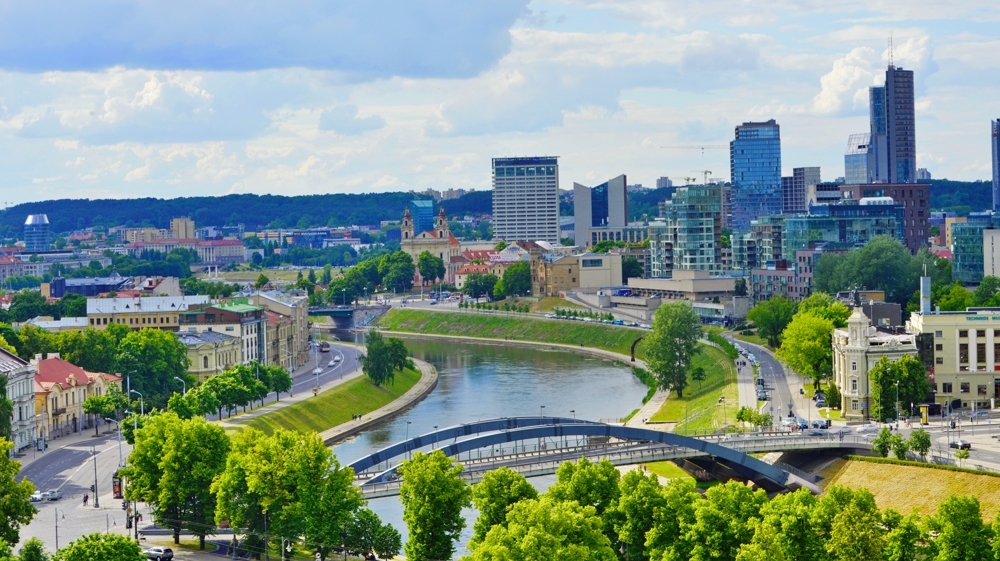Our Offices:

Lithuania is a new and active member of the European Union (since May 1, 2004) and the North Atlantic Treaty Organization (since March 29, 2004). It is the only Baltic country with a tradition of nearly eight hundred years of statehood. Its name was first mentioned almost one thousand years ago, in 1009. Wedged on the dividing line between Western and Eastern civilizations, Lithuania battled dramatically for its independence and survival. Once in the Middle Ages, Lithuania was the largest state in the entire Eastern Europe, crafts and overseas trade prospered.
In 1579, Vilnius University, an important scientific and education a centre on a European level, was founded. In the 16th century, Lithuania adopted its First, Second and Third Statutes. The Statutes not only were the backbone of the legislative system of the country, they also had a major impact on the legislation of other European states of the time. Despite losing its independence, Lithuania managed to retain its Third Statute in effect for as long as 250 years, and it was instrumental in the preservation of the national and civic self-awareness of the public. The Constitution of Lithuania-Poland, together with the French Constitution, both adopted in 1791, were the first constitutions in Europe.
Why study in Lithuania:
Lithuania has some of the best higher education institutions- colleges and universities. These institutions are known for their high quality of education and teaching level. The graduates from the Lithuanian higher education institutions are accepted worldwide for their skills and knowledge.
Also, in Lithuania the higher education institutions provide a wide spectrum of academic programmes and qualifications, therefore making it an ideal study destination to fulfil professional dreams. The programmes are recognized internationally provide great employment opportunities to students.
There are various scholarship opportunities in Lithuania. Scholarships are offered by the state, higher education institutions and International Scholarship Programs. Each higher education institution also has its own scholarship funds and financing schemes based on which one-time awards or other type of awards are given to the students meeting certain requirements from institution’s funds.
The higher education institutions follow the guidelines of the Bologna declaration. The Bologna process was initiated in 1999 when the Ministers of Education from 29 European countries signed the Bologna declaration in the Italian city of Bologna. The purpose of the process is to create educational standards for academic degrees and quality assurance, in order to make it easier for students to move from one European country to another and to improve the overall quality of European higher education. The system also incorporates aspects of the American higher education system and thus simplifies comparison. The Bologna System uses the European Credit Transfer System (ECTS) to measure the amount of higher education credits.
Higher education system
• Studies at higher education institutions in Lithuania can be of two types: non-university and university studies.
• Non-university studies are one-level (undergraduate) professional studies intended for preparation for a professional activity. 120-160 credits are required in order to complete non-university studies. These studies provide opportunities to acquire professional qualifications on the basis of applied research activities.
• Beginning from January 1, 2007 some colleges acquired the right to confer a Professional Bachelor’s degree.
University studies are organized in three cycles:
1st cycle (undergraduate) studies lead to a bakalauras (Bachelor) degree and/or professional qualification and give access to 2nd cycle studies. 140-180 credits are required in order to complete 1st cycle studies.
2nd cycle (graduate) studies lead to a magistras (Master) degree or to magistras (Master) degree combined with and a professional qualification and give access to 3rd cycle studies. In order to complete 2nd cycle studies 60 – 80 credits are required.
After full completion of another type of graduate studies – specialized professional studies – a professional qualification is obtained without the right to enter university 3rd cycle studies. In order to complete these studies, 40 – 80 credits are required.
Three different types of 3rd cycle (postgraduate) studies are available: doktorantūra (doctoral studies) – studies leading to a research degree (not more than 4 years nominal duration); rezidentūra (residency) – studies of Medicine, Odontology, and Veterinary Medicine to prepare specialists for practical activities and leading to a professional qualification (3-6 years nominal duration); meno aspirantūra (art studies) – studies devoted to the training and specialization of artists and leading to a meno licenciatas degree
There are also vientisosios (integrated) university studies (combining 1st and 2nd cycle). After successful completion of integrated studies, Master’s degree and/or professional qualification is awarded and access to 3rd cycle (postgraduate) studies is granted. Traditionally, this type of studies is given in the fields of medicine, engineering, law and religious studies. Workload in credits of these studies varies: no less than 180 national credits are required for professional qualification and/ or 200-240 credits for Master’s degree. Studies in the field of Medicine, Odontology ant Veterinary Medicine could be more extensive, but in any case do not require more than 280 credits.
